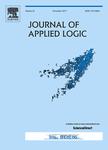版权所有:内蒙古大学图书馆 技术提供:维普资讯• 智图
内蒙古自治区呼和浩特市赛罕区大学西街235号 邮编: 010021

作者机构:Univ London Imperial Coll Sci Technol & Med Dept Comp London SW7 2AZ England Univ Bristol Dept Comp Sci Bristol BS8 1UB Avon England Univ Buenos Aires Dept Computac RA-2160 Buenos Aires DF Argentina
出 版 物:《JOURNAL OF APPLIED LOGIC》 (应用逻辑学杂志)
年 卷 期:2009年第7卷第3期
页 面:275-288页
核心收录:
学科分类:01[哲学] 0701[理学-数学] 0812[工学-计算机科学与技术(可授工学、理学学位)]
基 金:Saudi Arabian Ministry of Higher Education Seventh Framework Programme, FP7, (204853) Engineering and Physical Sciences Research Council, EPSRC, (PBM C541133/1, UBACyT X020) Consejo Nacional de Investigaciones Científicas y Técnicas, CONICET Agencia Nacional de Promoción Científica y Tecnológica, ANPCyT, (11738, 32440)
主 题:Inductive logic programming Abductive reasoning Goal-oriented requirements engineering Scenario-based specification Linear temporal logic Event Calculus
摘 要:Requirements Engineering involves the elicitation of high-level stakeholder goals and their refinement into operational system requirements. A key difficulty is that stakeholders typically convey their goals indirectly through intuitive narrative-style scenarios of desirable and undesirable system behaviour, whereas goal refinement methods usually require goals to be expressed declaratively using, for instance, a temporal logic. In actual software engineering practice, the extraction of formal requirements from scenario-based descriptions is a tedious and error-prone process that would benefit from automated tool support. This paper presents an Inductive Logic Programming method for inferring operational requirements from a set of example scenarios and an initial but incomplete requirements specification. The approach is based on translating the specification and the scenarios into an event-based logic programming formalism and using a non-monotonic reasoning system, called eXtended Hybrid Abductive Inductive Learning, to automatically infer a set of event pre-conditions and trigger-conditions that cover all desirable scenarios and reject all undesirable ones. This learning task is a novel application of logic programming to requirements engineering that also demonstrates the utility of non-monotonic learning capturing pre-conditions and trigger-conditions. (C) 2008 Elsevier B.V. All rights reserved.